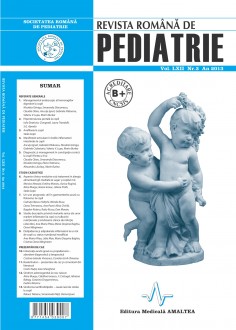SELECT ISSUE

Indexed

| |

|
|
|
| |
|
|
|

|
|
|
|
|
|
|
HIGHLIGHTS
National Awards “Science and Research”
NEW! RJP has announced the annually National Award for "Science and Research" for the best scientific articles published throughout the year in the official journal.
Read the Recommendations for the Conduct, Reporting, Editing, and Publication of Scholarly work in Medical Journals.
The published medical research literature is a global public good. Medical journal editors have a social responsibility to promote global health by publishing, whenever possible, research that furthers health worldwide.
Bruton disease – case presentation and relevant studies comments
Costin Nuţă and Ioan Gherghina
ABSTRACT
Bruton disease is a primary immunodeficiency consisting in severe hypogammaglobulinemia with a serious decrease of B cells by mutations at the level of Btk gene, causing severe recurrent infections that may result in death. Objectives. Presentation of a suggestive case of severe hypogammaglobulinemia with invalidating infectious complications up to the date when the Bruton disease diagnosis was set and the substitution treatment was initiated. Methods. From all cases treated by us as part of the Primary Immunodeficiency Program conducted within “Alfred Rusescu” IOMC, a Bruton disease case was selected; such case displayed specific clinical symptoms, diagnosis methods, treatment and evolution while it was under examination. Results. The selected case was characterized by an early onset of lung infectious complications that resulted in right basal bronchiectasis and osteo-articular infections. The Bruton disease diagnosis was set at the age of 15, when the substitution treatment was initiated. Such treatment improved the prognosis. Conclusions. The presence of frequent and severe infectious episodes in children requires the physician to analyze the possibility of a congenital immunodeficiency. In Bruton disease, the immunoglobulin substitution treatment is the first line treatment.
Key words: Bruton disease, XLA, X linked agammaglobulinemia, hypogammaglobulinemia
